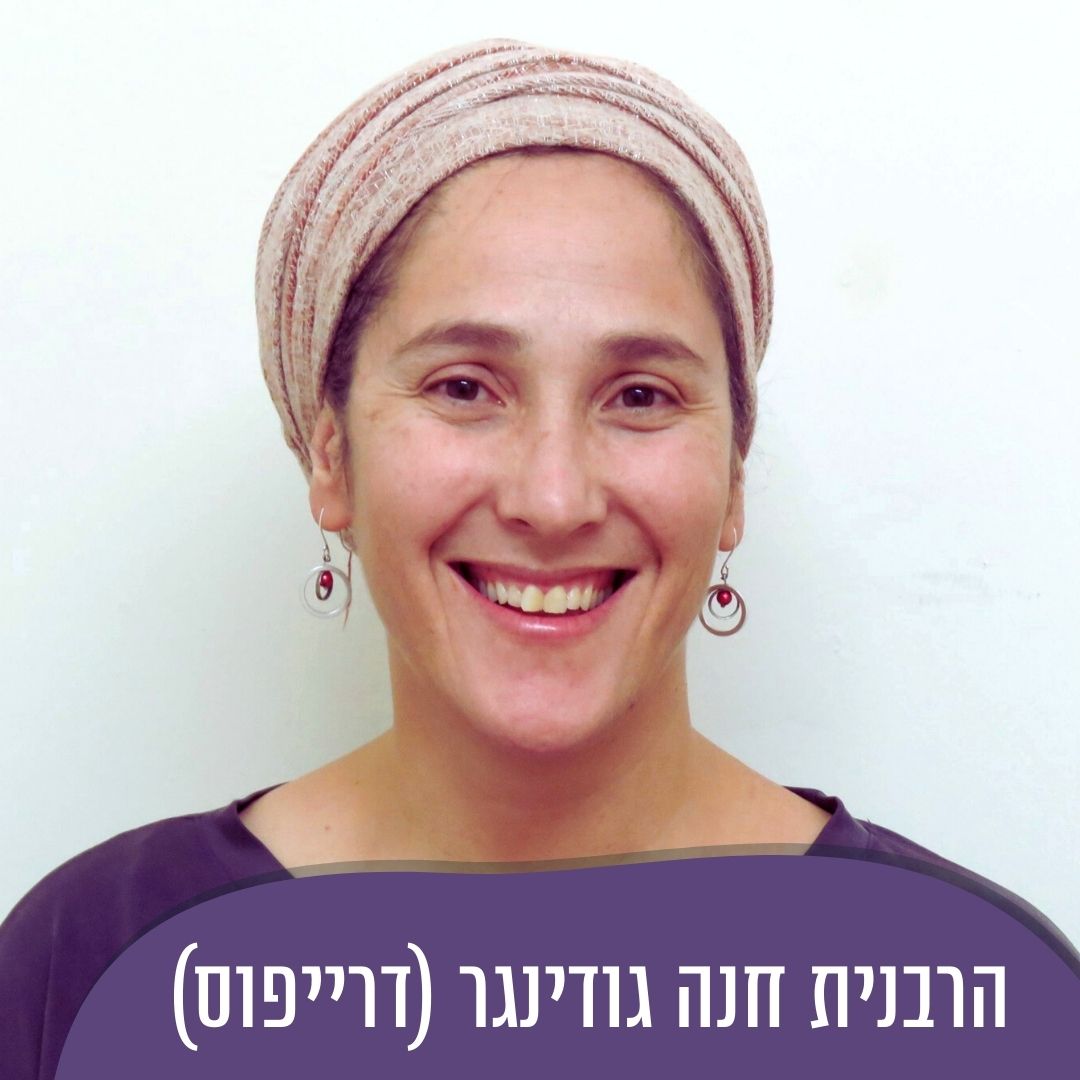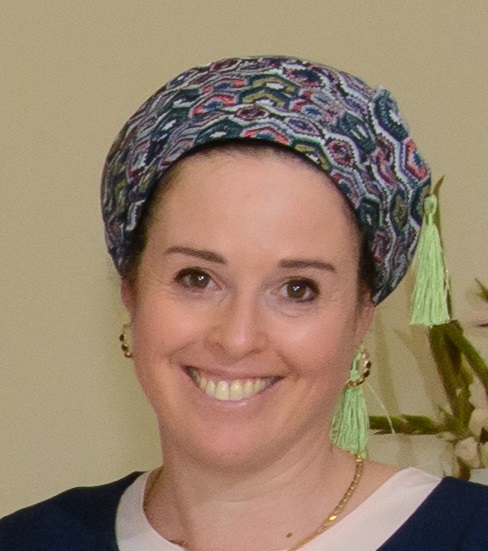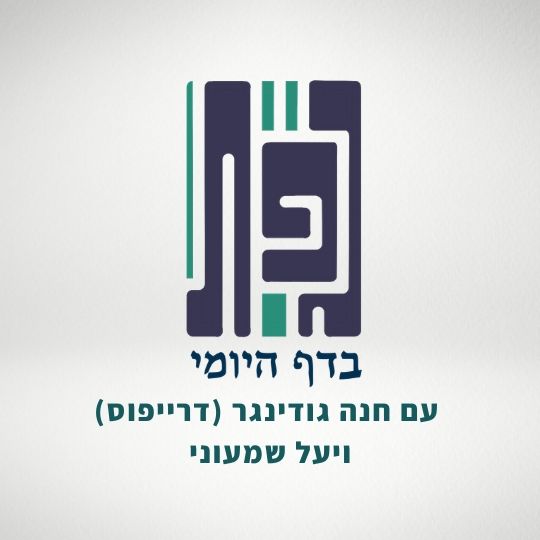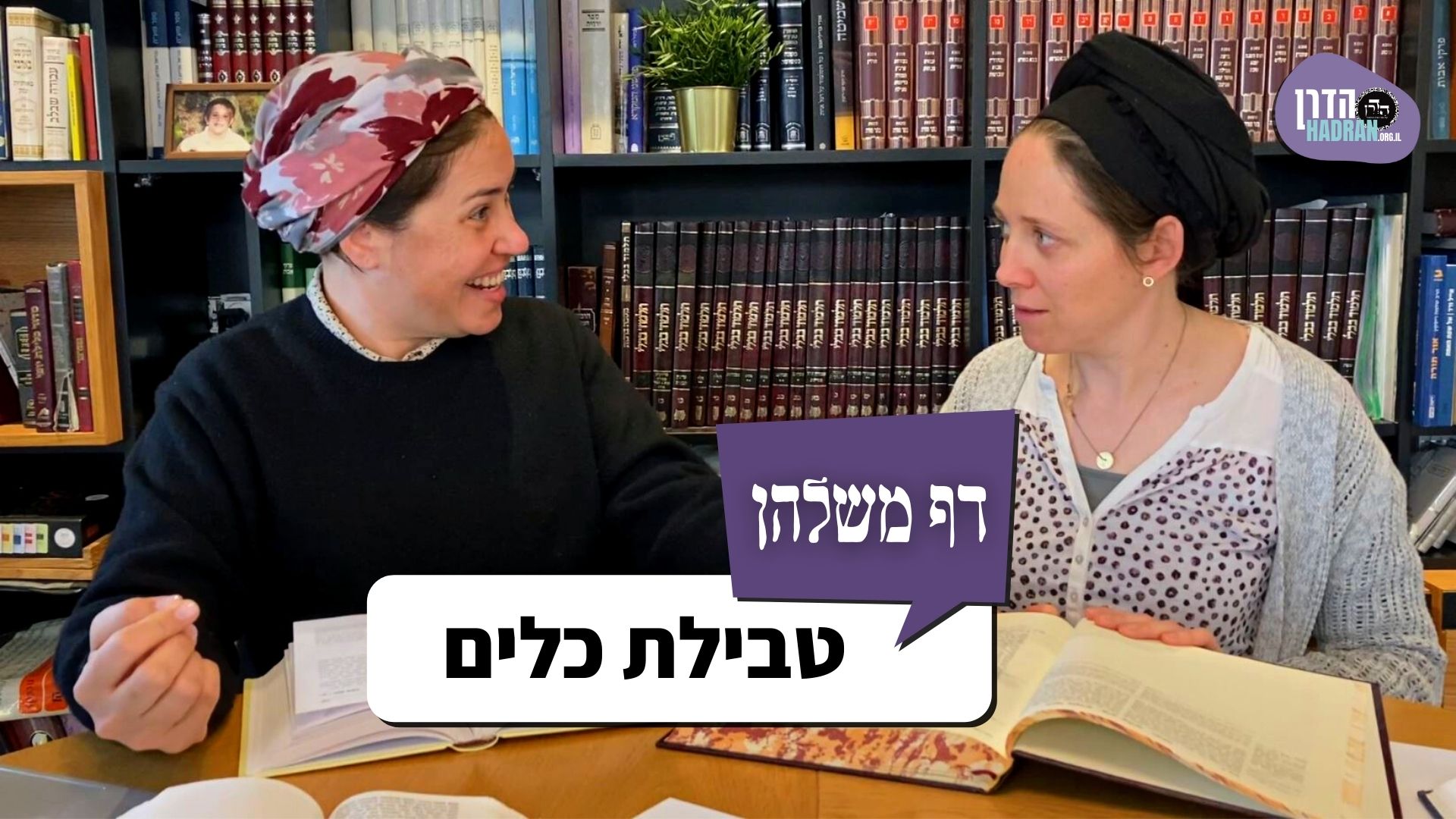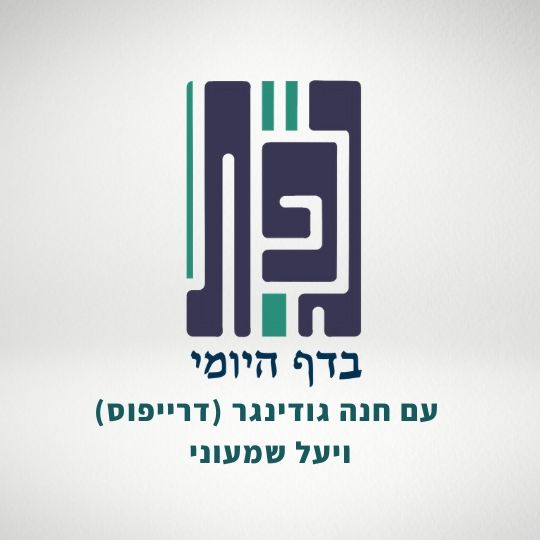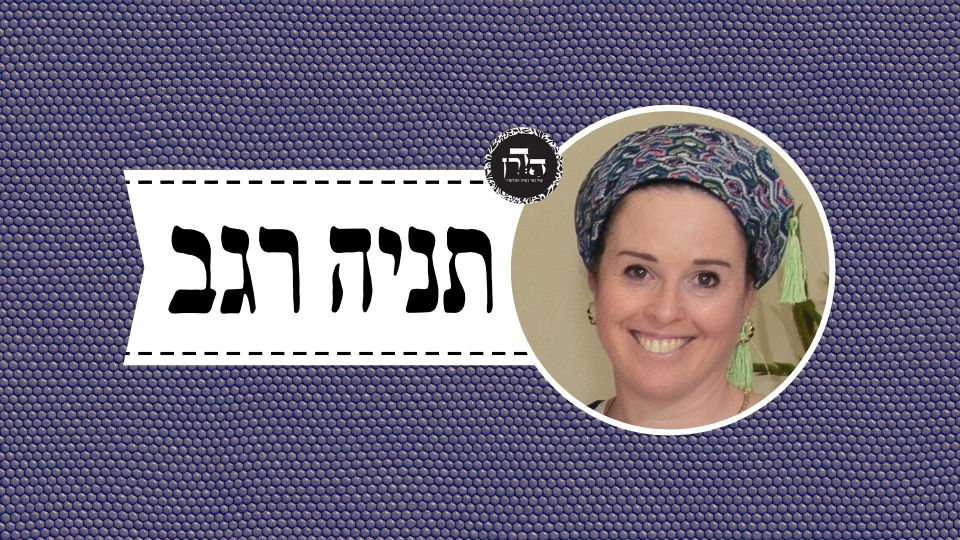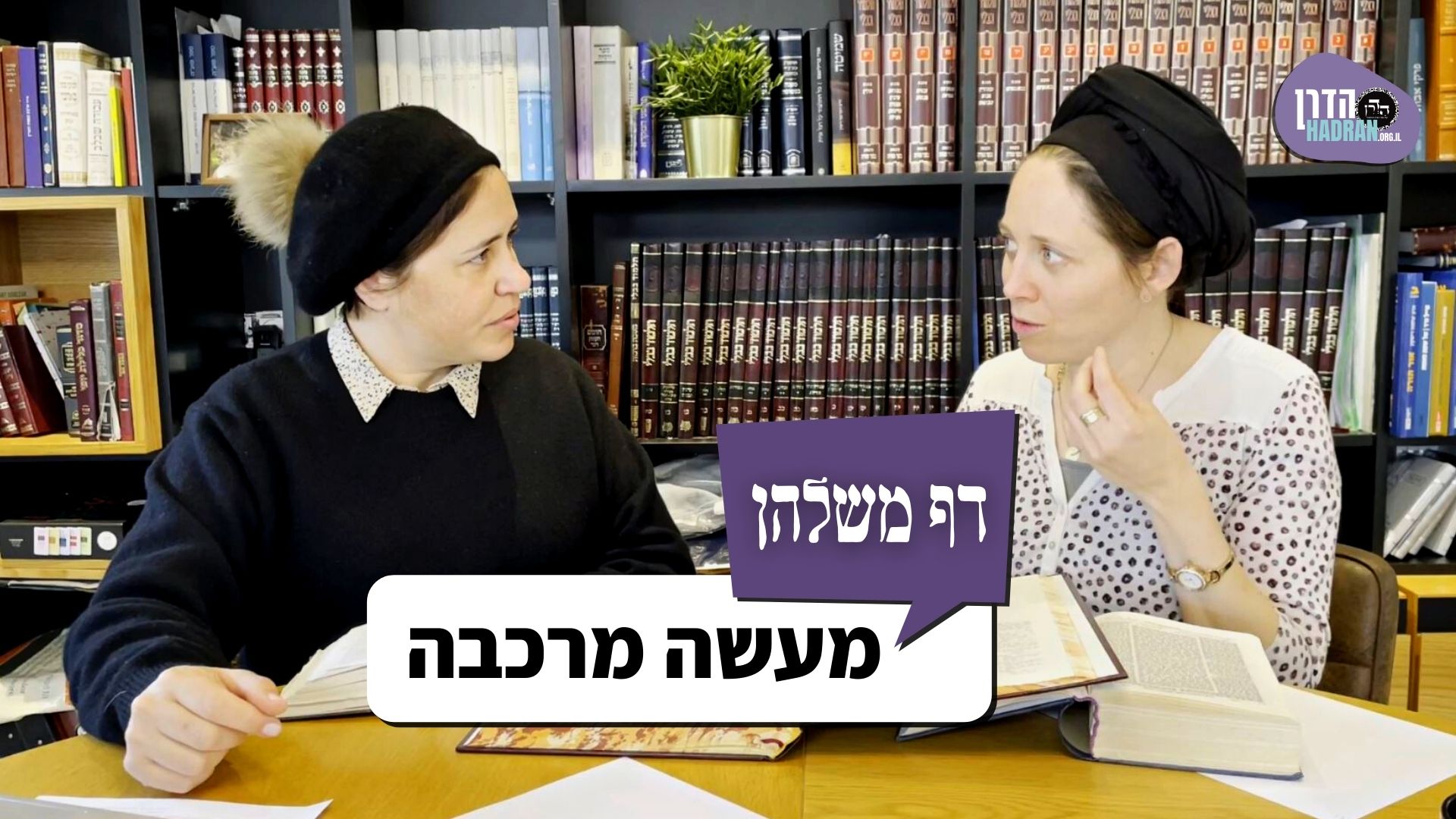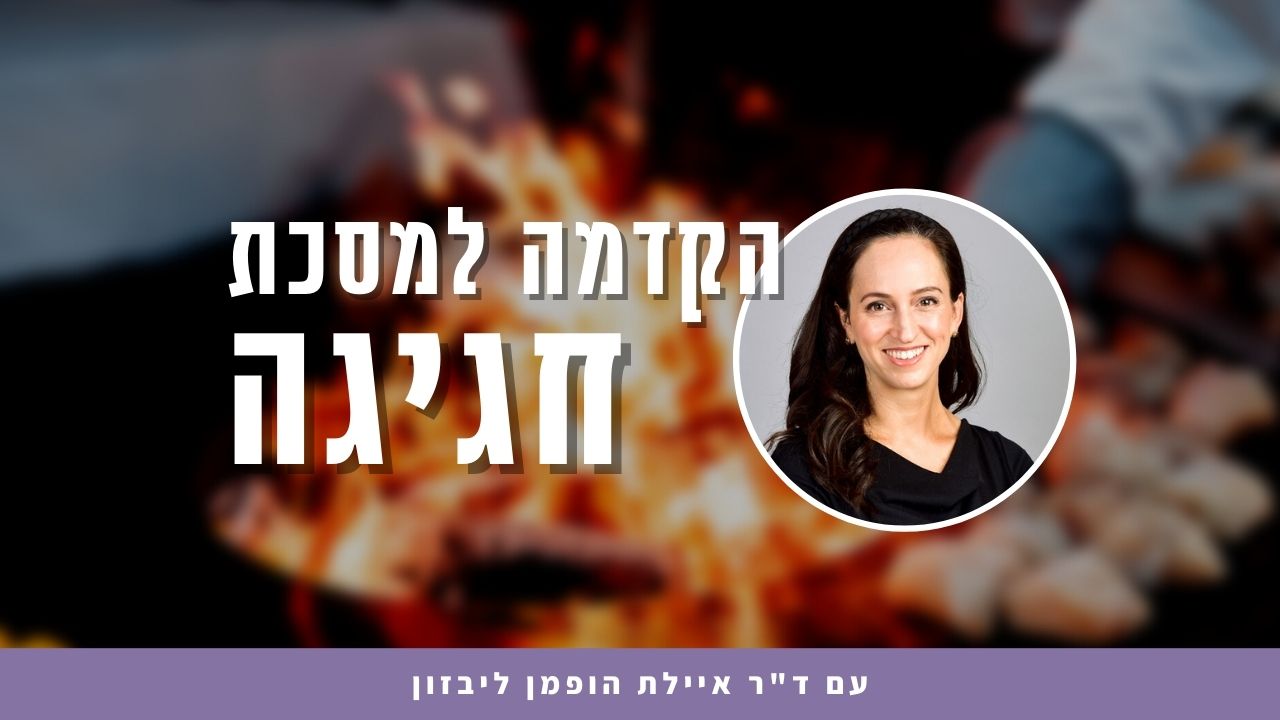חגיגה יז
רַב אָשֵׁי אָמַר: אֲפִילּוּ תֵּימָא צְדָדִין מוּתָּרִין, כָּל דְּבַהֲדֵי גַּבַּהּ — כְּגַבַּהּ דָּמֵי.
Rav Ashi said: Even if you say that sides are permitted in general, there is no proof from here, since anything that is near the animal’s back is considered as its back. Therefore, placing the hands on the head of the animal is the same as placing them on the animal itself, as opposed to its sides.
מַתְנִי׳ בֵּית שַׁמַּאי אוֹמְרִים: מְבִיאִין שְׁלָמִים, וְאֵין סוֹמְכִין עֲלֵיהֶם, אֲבָל לֹא עוֹלוֹת. וּבֵית הִלֵּל אוֹמְרִים: מְבִיאִין שְׁלָמִים וְעוֹלוֹת, וְסוֹמְכִין עֲלֵיהֶם.
MISHNA: Beit Shammai say: One may bring peace-offerings on a Festival because both the owners and the priests partake of them, but one may not place his hands on them, on the peace-offerings before sacrificing them. However, one may not bring burnt-offerings at all because they are not eaten, and labor is permitted on Festivals only for the sake of preparing food for humans. And Beit Hillel say: One may bring peace-offerings and also burnt-offerings, and one places his hands on both of them.
עֲצֶרֶת שֶׁחָל לִהְיוֹת בְּעֶרֶב שַׁבָּת, בֵּית שַׁמַּאי אוֹמְרִים: יוֹם טְבוֹחַ אַחַר הַשַּׁבָּת. וּבֵית הִלֵּל אוֹמְרִים: אֵין יוֹם טְבוֹחַ אַחַר הַשַּׁבָּת. וּמוֹדִים שֶׁאִם חָלָה לִהְיוֹת בְּשַׁבָּת, שֶׁיּוֹם טְבוֹחַ אַחַר הַשַּׁבָּת.
If the festival of Shavuot occurs on the eve of Shabbat, Beit Shammai say: The day of slaughter is after Shabbat, on Sunday. This is the day on which the animals brought in honor of the pilgrim Festival are slaughtered, since they maintain that the Festival burnt-offering is not sacrificed on the Festival day itself but on the following day, and all burnt-offerings vowed by individuals are postponed to the following day. And Beit Hillel say: The day of slaughter is not after Shabbat. Since the slaughter may be performed on the Festival day itself, it is unnecessary to postpone it. But they concede that if Shavuot occurs on Shabbat, the day of slaughter is after Shabbat.
אֵין כֹּהֵן גָּדוֹל מִתְלַבֵּשׁ בְּכֵלָיו, וּמוּתָּרִין בְּהֶסְפֵּד וּבְתַעֲנִית, שֶׁלֹּא לְקַיֵּים דִּבְרֵי הָאוֹמְרִין: עֲצֶרֶת אַחַר הַשַּׁבָּת.
The mishna relates that when the day of slaughter was on a Sunday, the High Priest would not dress in his festive garments but would wear his regular clothing. And all were permitted to eulogize and fast on this day. This was done in order not to uphold and reinforce the opinion of the Sadducees, who would say: Shavuot must always occur after Shabbat. As the day of slaughter was on Sunday, it was necessary to demonstrate that we do not accept the view of the Sadducees, and that the day is not a Festival.
גְּמָ׳ אָמַר רַבִּי אֶלְעָזָר אָמַר רַבִּי אוֹשַׁעְיָא: מִנַּיִין לָעֲצֶרֶת שֶׁיֵּשׁ לָהּ תַּשְׁלוּמִין, כָּל שִׁבְעָה — שֶׁנֶּאֱמַר: ״בְּחַג הַמַּצּוֹת וּבְחַג הַשָּׁבוּעוֹת וּבְחַג הַסּוּכּוֹת״, מַקִּישׁ חַג הַשָּׁבוּעוֹת לְחַג הַמַּצּוֹת: מָה חַג הַמַּצּוֹת יֵשׁ לָהּ תַּשְׁלוּמִין כָּל שִׁבְעָה — אַף חַג הַשָּׁבוּעוֹת יֵשׁ לָהּ תַּשְׁלוּמִין כָּל שִׁבְעָה.
GEMARA: Rabbi Elazar said that Rabbi Oshaya said: From where is it derived that the Shavuot offerings can be redressed, i.e., that the obligatory Festival offerings can be sacrificed all seven days following the Festival? As it is stated: “Three times a year all your males shall appear…on the festival of Passover, and on the festival of Shavuot, and on the festival of Sukkot” (Deuteronomy 16:16). The verse compares the festival of Shavuot to the festival of Passover by analogy: Just as one can redress the failure to bring the offering on the festival of Passover on all seven days of the Festival, so too, on the festival of Shavuot, one can redress the failure to bring the offering for all seven, i.e., Shavuot and the six days following it.
וְאֵימָא: מַקִּישׁ לְחַג הַסּוּכּוֹת, מָה חַג הַסּוּכּוֹת יֵשׁ לָהּ תַּשְׁלוּמִין כָּל שְׁמוֹנָה — אַף חַג הַשָּׁבוּעוֹת יֵשׁ לָהּ תַּשְׁלוּמִין כָּל שְׁמוֹנָה! שְׁמִינִי רֶגֶל בִּפְנֵי עַצְמוֹ הוּא.
The Gemara raises a difficulty: But perhaps you should say instead that the verse compares Shavuot to the festival of Sukkot by analogy: Just as the Festival day of Sukkot can be redressed for all eight days, as the Eighth Day of Assembly is part of the Festival, so too can the festival of Shavuot be redressed for all eight days. The Gemara answers: The Eighth Day of Assembly is an independent pilgrimage Festival and is not considered part of Sukkot.
אֵימוֹר דְּאָמְרִי[נַן] שְׁמִינִי רֶגֶל בִּפְנֵי עַצְמוֹ הוּא — הָנֵי מִילֵּי לְעִנְיַן פָּזֵ״ר קֶשֶׁ״ב. אֲבָל לְעִנְיַן תַּשְׁלוּמִין — תַּשְׁלוּמִין דְּרִאשׁוֹן הוּא. דִּתְנַן: מִי שֶׁלֹּא חָג בְּיוֹם טוֹב הָרִאשׁוֹן שֶׁל חַג — חוֹגֵג אֶת כָּל הָרֶגֶל, וְיוֹם טוֹב הָאַחֲרוֹן.
The Gemara continues to ask: You can say that when they said that The Eighth Day of Assembly is an independent pilgrimage Festival, this applies only to the issue of peh, zayin, reish, kuf, shin, beit, an acronym for the six halakhot that differentiate The Eighth Day of Assembly from the festival of Sukkot. But with regard to the redress of the Festival offerings, it is considered a day of redress for the first Festival day, as we learned in a mishna (9a): One who did not celebrate by sacrificing the Festival offerings on the first day of the Sukkot Festival can celebrate by sacrificing them throughout the pilgrimage Festival of Sukkot and on the last day of that Festival. If so, the question remains: Why do we not compare Shavuot to Sukkot and allow its offerings to be completed on all eight days?
תָּפַשְׂתָּ מְרוּבֶּה לֹא תָּפַשְׂתָּ, תָּפַשְׂתָּ מוּעָט תָּפַשְׂתָּ.
The Gemara answers by implementing the following principle: If you grasped many, you did not grasp anything; if you grasped few, you grasped something. In other words, when one must choose between a smaller number and a larger one, there is more certainty in choosing the smaller one. Even if that choice turns out to be erroneous, it is preferable to the larger one, as it is included in it. In this case, seven is included in eight. Therefore, it is preferable to compare Shavuot to the seven days of Passover than to the eight days of Sukkot.
אֶלָּא, לְמַאי הִלְכְתָא כַּתְבֵיהּ רַחֲמָנָא לְחַג הַסּוּכּוֹת? לְאַקּוֹשֵׁי לְחַג הַמַּצּוֹת: מָה חַג הַמַּצּוֹת טָעוּן לִינָה — אַף חַג הַסּוּכּוֹת טָעוּן לִינָה.
The Gemara asks: But if we do not compare Shavuot to Sukkot, for the sake of what halakha did the Merciful One write the festival of Sukkot in this context? The laws of all the Festivals were already listed, so the Torah must have mentioned their names again in order to compare them for a particular reason. The Gemara answers: The festival of Sukkot was mentioned in order to compare it by analogy to the festival of Passover, in the following manner: Just as the festival of Passover requires lodging overnight in Jerusalem after the conclusion of the Festival, as one may not depart that night, so too the festival of Sukkot requires lodging in Jerusalem after Sukkot has ended.
וְהָתָם מְנָלַן?
The Gemara asks: And there, with regard to Passover itself, from where do we derive that it requires lodging?
דִּכְתִיב: ״וּפָנִיתָ בַבֹּקֶר וְהָלַכְתָּ לְאֹהָלֶיךָ״.
The Gemara answers: One may leave Jerusalem only in the morning, after staying there for the night following the Festival, as it is written following the laws of the Paschal offering: “And you shall turn in the morning and go to your tents” (Deuteronomy 16:7).
תְּנַן: עֲצֶרֶת שֶׁחָל לִהְיוֹת עֶרֶב שַׁבָּת, בֵּית שַׁמַּאי אוֹמְרִים: יוֹם טְבוֹחַ אַחַר הַשַּׁבָּת, וּבֵית הִלֵּל אוֹמְרִים: אֵין לָהּ יוֹם טְבוֹחַ. מַאי לָאו, אֵין לָהּ יוֹם טְבוֹחַ כְּלָל? לָא, שֶׁאֵינָהּ צְרִיכָה יוֹם טְבוֹחַ.
§ We learned in the mishna: If the festival of Shavuot occurs on the eve of Shabbat, Beit Shammai say: The day of slaughter is after Shabbat; and Beit Hillel say: It does not have a day of slaughter. What, is it not that it does not have a day of slaughter at all; i.e., there are no days of redress for an offering that was meant to be sacrificed on the festival of Shavuot itself? The Gemara rejects this: No, Beit Hillel means that it does not require a day of slaughter.
וּמַאי קָא מַשְׁמַע לַן — דִּמְקָרְבִינַן בְּיוֹמֵיהּ, הָא אִיפְּלִיגוּ בַּהּ חֲדָא זִימְנָא! דִּתְנַן, בֵּית שַׁמַּאי אוֹמְרִים: מְבִיאִין שְׁלָמִים וְאֵין סוֹמְכִין עֲלֵיהֶם, אֲבָל לֹא עוֹלוֹת, וּבֵית הִלֵּל אוֹמְרִים: מְבִיאִין שְׁלָמִים וְעוֹלוֹת וְסוֹמְכִין עֲלֵיהֶם.
The Gemara asks: And what does this teach us; that all offerings are sacrificed on their day? But they have already disputed this once, as we learned in a mishna: Beit Shammai say: One may bring peace-offerings on a Festival but one may not place his hands on them. However, one may not bring burnt-offerings at all; and Beit Hillel say: One may bring peace-offerings and also burnt-offerings, and one places his hands on both of them. Why is it necessary to restate this argument in different terms?
צְרִיכָא, דְּאִי אַשְׁמְעִינַן בְּהָא: בְּהָא קָא אָמְרִי בֵּית שַׁמַּאי, מִשּׁוּם דְּאֶפְשָׁר לִמְחַר. אֲבָל הָכָא, אֵימָא מוֹדוּ לְהוּ לְבֵית הִלֵּל.
The Gemara answers: It is necessary, for had the mishna taught us only this case, that Beit Shammai prohibits bringing burnt-offerings on a Festival, we might have said: It is with regard to this case, a regular Festival followed by a weekday, that Beit Shammai state their opinion, because it is possible to sacrifice these burnt-offerings on the following day, on the day of slaughter after the Festival; but there, with regard to a Shavuot that occurs on a Friday, when one cannot sacrifice offerings on the following day, you might perhaps say that they agree with Beit Hillel that the burnt-offerings should be sacrificed on the Festival itself. It was therefore necessary to state that Beit Shammai’s view is the same in both cases.
וְאִי אַשְׁמְעִינַן בְּהָא: בְּהָא קָאָמְרִי בֵּית הִלֵּל, מִשּׁוּם דְּלָא אֶפְשָׁר לִמְחַר, אֲבָל בְּהָא — אֵימָא מוֹדוּ לְבֵית שַׁמַּאי, צְרִיכָא.
The reverse also applies: And had it taught us only that case, that there is no day of slaughter after Shabbat, we might have said: It is with regard to that case that Beit Hillel state their view, that the offerings should be sacrificed on the Festival itself, because it is not possible to sacrifice them on the following day, which is Shabbat; but here, on a regular Festival followed by a weekday, you might say that perhaps they agree with Beit Shammai. It is therefore necessary for the mishna to specify both cases. The question of whether there are days of redress for Shavuot according to Beit Hillel therefore remains unresolved.
תָּא שְׁמַע: מִי שֶׁלֹּא חָג שִׁבְעַת יְמֵי הַפֶּסַח, וּשְׁמוֹנַת יְמֵי הֶחָג, וְיוֹם טוֹב הָרִאשׁוֹן שֶׁל עֲצֶרֶת, שׁוּב אֵינוֹ חוֹגֵג. מַאי לָאו: יוֹם טוֹב שֶׁל עֲצֶרֶת! לֹא, יוֹם טְבוֹחַ. אִי הָכִי, נִיפְשׁוֹט מִינַּהּ דְּחַד יוֹם טְבוֹחַ! אֵימָא: יְמֵי טְבוֹחַ.
The Gemara suggests: Come and hear a proof from a different source: One who did not celebrate by sacrificing the peace-offerings of the Festival on the seven days of Passover, or on the eight days of the festival of Sukkot, or on the first day of Shavuot may no longer celebrate and sacrifice those offerings. The Gemara infers: Does this not mean that if one did not sacrifice on the Festival day of Shavuot itself, this lapse cannot be remedied, thereby demonstrating that there are no days of redress for Shavuot? The Gemara refutes this: No, the term Festival day is referring to the day of slaughter, rather than the Festival itself. The Gemara immediately counters: If so, let us at least resolve from here, i.e., the mishna that there is only one day of slaughter and not seven days. The Gemara rejects this: Say that the wording of the mishna should be corrected, so that instead of: A day of slaughter, it reads: Days of slaughter.
תָּא שְׁמַע, דְּתָנֵי רַבָּה בַּר שְׁמוּאֵל: אָמְרָה תּוֹרָה מְנֵה יָמִים וְקַדֵּשׁ חֹדֶשׁ, מְנֵה יָמִים וְקַדֵּשׁ עֲצֶרֶת. מָה חֹדֶשׁ — לִמְנוּיָיו, אַף עֲצֶרֶת — לִמְנוּיֶיהָ. מַאי לָאו: גָּמַר מֵחֹדֶשׁ, מָה חֹדֶשׁ — יוֹם אֶחָד, אַף עֲצֶרֶת — יוֹם אֶחָד!
The Gemara suggests further: Come and hear a proof from another source, as Rabba bar Shmuel taught the following baraita: The Torah said to count thirty days, as it is stated: “A month of days” (Numbers 11:20), and then sanctify the month with offerings. And the Torah also said to count days from Passover and then sanctify the festival of Shavuot with offerings, as it is stated: “You shall count fifty days” (Leviticus 23:16). From this comparison, we learn the following halakha: Just as the new month is sanctified for the unit of time by which it is counted, i.e., for one day, so too, Shavuot is sanctified for the unit of time by which it is counted, i.e., for one full week, as it is stated: “Seven complete weeks shall there be” (Leviticus 23:15). The Gemara infers from this: Does this not mean that we learn from the month? If so, we can also learn that just as the festival of a month, the New Moon, is one day, so too Shavuot is only one day, without days of redress.
אָמַר רָבָא: וְתִסְבְּרָא?! אַטּוּ עֲצֶרֶת, יוֹמֵי מָנֵינַן שָׁבוּעֵי לָא מָנֵינַן? וְהָאָמַר אַבָּיֵי: מִצְוָה לְמִימְנֵי יוֹמֵי, דִּכְתִיב: ״תִּסְפְּרוּ חֲמִשִּׁים יוֹם״, וּמִצְוָה לְמִימְנֵי שָׁבוּעֵי, דִּכְתִיב: ״שִׁבְעָה שָׁבוּעוֹת תִּסְפָּר לָךְ״. וְעוֹד: ״חַג שָׁבוּעוֹת״, כְּתִיב.
Rava said: And how can you understand it that way? Is that to say that for Shavuot we count days but we do not count weeks? Didn’t Abaye say: It is a mitzva to count days, in the counting of the omer, as it is written: “Until the morrow of the seventh week, you shall count fifty days” (Leviticus 23:16); and it is also a mitzva to count weeks, as it is written: “Seven weeks you shall count for yourself, from when the sickle is first put to the standing corn” (Deuteronomy 16:9); and further, it is written: “The festival of weeks [shavuot]” (Deuteronomy 16:10), which indicates that it is a Festival that is established through a count of weeks? Consequently, the days of redress for Shavuot should last a week, in accordance with its components.
דְּבֵי רַבִּי אֱלִיעֶזֶר בֶּן יַעֲקֹב תָּנָא, אָמַר קְרָא: ״וּקְרָאתֶם וּבְקֻצְרְכֶם״. אֵיזֶהוּ חַג שֶׁאַתָּה קוֹרֵא וְקוֹצֵר בּוֹ — הֱוֵי אוֹמֵר זֶה חַג עֲצֶרֶת.
§ In the school of Rabbi Eliezer ben Ya’akov, a Sage taught the following: The verse states with regard to Shavuot: “And you shall make a proclamation on this very day, it shall be a holy convocation, you shall do no kind of laborious work” (Leviticus 23:21), and it states in the same chapter: “And when you reap the harvest of your land” (Leviticus 23:22). Which is the Festival on which you make a proclamation and also reap, i.e., which Festival occurs in the harvest season? You must say it is the festival of Shavuot.
אֵימַת? אִילֵּימָא בְּיוֹם טוֹב — קְצִירָה בְּיוֹם טוֹב מִי שְׁרֵי? אֶלָּא לָאו לְתַשְׁלוּמִין.
The Gemara proceeds to analyze the teaching: When exactly does this refer to? If we say it is referring to the Festival day itself, is it permitted to reap on a Festival? Obviously, ordinary work is prohibited on Festivals. Rather, is it not referring to the issue of redress? In other words, it speaks of those days on which redress can be made for the offerings of the Festival, i.e., the days of slaughter, on which one may indeed reap because they are regular weekdays, and they nevertheless have a festive quality.
וְאַף עַל גַּב דְּאִיתְּמַר דְּרַבִּי אֶלְעָזָר אָמַר רַבִּי אוֹשַׁעְיָא, אִצְטְרִיךְ דְּרַבִּי אֱלִיעֶזֶר בֶּן יַעֲקֹב. דְּאִי מִדְּרַבִּי אֶלְעָזָר אָמַר רַבִּי אוֹשַׁעְיָא — הֲוָה אָמֵינָא: מָה תַּשְׁלוּמִין שֶׁל חַג הַמַּצּוֹת אָסוּר בַּעֲשִׂיַּית מְלָאכָה, אַף תַּשְׁלוּמֵי עֲצֶרֶת נָמֵי אָסוּר בַּעֲשִׂיַּית מְלָאכָה, קָמַשְׁמַע לַן דְּרַבִּי אֱלִיעֶזֶר בֶּן יַעֲקֹב. וְאִי מִדְּרַבִּי אֱלִיעֶזֶר בֶּן יַעֲקֹב,
The Gemara comments: And even though the teaching that Rabbi Elazar said that Rabbi Oshaya said, that the halakha of the redress for Shavuot is derived from the comparison to Passover, was stated, it was nevertheless necessary to state the teaching of Rabbi Eliezer ben Ya’akov as well, for if we had learned only the proof that Rabbi Elazar said that Rabbi Oshaya said, I would say the following: Just as on the days of redress for the festival of Passover it is prohibited to perform any work that will not cause irretrievable loss, as they are part of the Festival, so too on the days of redress for Shavuot it is also prohibited to perform work. We are therefore taught the statement of Rabbi Eliezer ben Ya’akov as well, that on these festive days one may reap, as they are weekdays. Conversely, if we had learned the halakha only from the words of Rabbi Eliezer ben Ya’akov,

